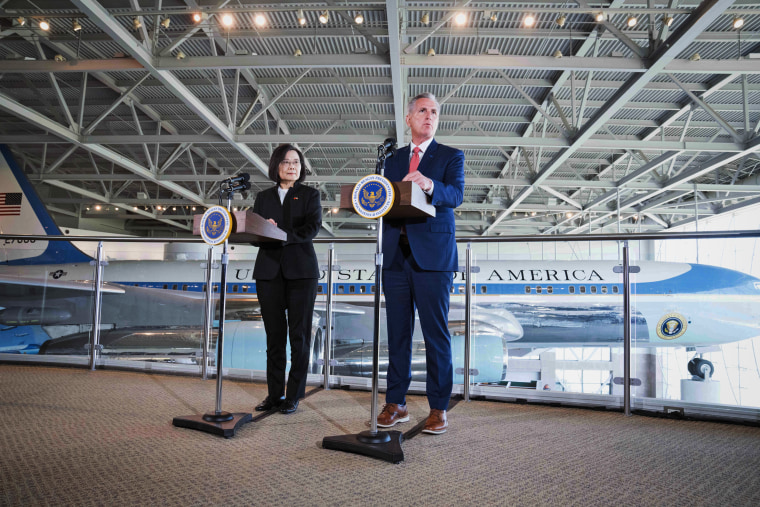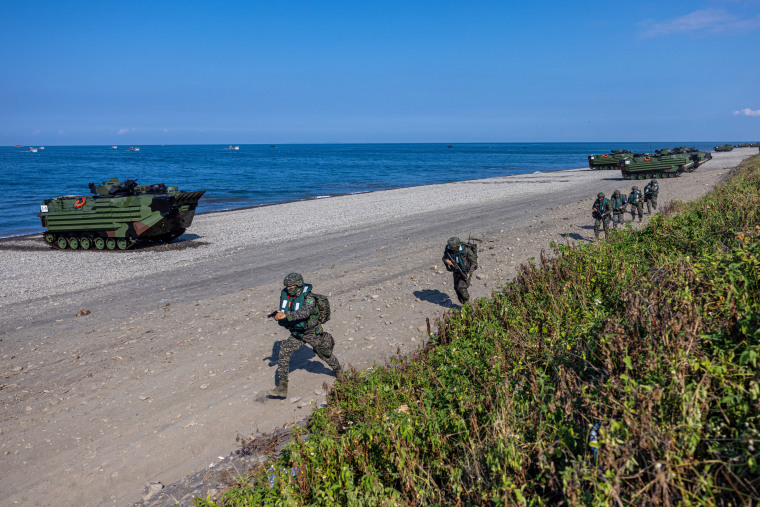TAIPEI, Taiwan — U.S. officials had an unmistakable message for China this week: We stand with Taiwan.
On Wednesday, House Speaker Kevin McCarthy, R-Calif., defied Chinese threats of retaliation by appearing with Taiwanese President Tsai Ing-wen in California, the most senior U.S. official to meet with a Taiwanese leader on U.S. soil in decades. As soon as Tsai returns to Taiwan, she will meet with a bipartisan congressional delegation led by Rep. Michael McCaul, R-Texas, the head of the House Foreign Affairs Committee.
China accused McCarthy and Tsai of promoting the independence of Taiwan, a self-ruling democracy that Beijing claims as its territory. The status of Taiwan is among the biggest flashpoints in U.S.-China relations, which are at their lowest point in decades. Though the United States does not have official relations with Taiwan, it is the island’s most important international backer.

There are political, economic and cultural reasons Americans should care about Taiwan, said Lev Nachman, a political scientist and assistant professor at National Chengchi University in Taipei.
“Politically, it helps keep peace and stability in the world for Taiwan to remain a free and fair democracy as it exists,” he said.
“Economically, Taiwan is one of the United States’s most important trading partners, and one of the most important economic pieces of the global economy,” particularly as a manufacturer of strategically important semiconductor chips.
Culturally, Nachman said, “what the everyday American wants is very similar to what the everyday Taiwanese person wants, which is to be able to wake up and try to fulfill whatever their livelihood dreams are.”
Here’s how the dispute started and why it matters.
What is the origin of the Taiwan issue?
The roots go back almost 75 years to 1949, when the ruling Nationalist Party (also known as the Kuomintang, or KMT) led by Gen. Chiang Kai-shek was defeated by Mao Zedong’s Communist Party in the Chinese Civil War.
The defeated government, known as the Republic of China, fled to Taiwan, an island 100 miles off the southeastern Chinese coast that is almost twice the size of New Jersey. In Beijing, Mao established his own government, which is still known today as the People’s Republic of China. Both declared themselves the sole legitimate Chinese government.

The split was — and is — a sore subject for Beijing. Like Chinese leaders before him, President Xi Jinping says China — which shares deep economic and trade ties with Taiwan — seeks peaceful unification with the island but has not ruled out the use of force to bring it under control.
As China’s military capabilities have increased in recent decades, so has its pressure on Taiwan. Near-daily activity such as sorties by Chinese warplanes has further intensified since Nancy Pelosi, the House speaker at the time, visited the island last August.
The Chinese Communist Party has never controlled Taiwan, which before the end of World War II had spent centuries being colonized by the Netherlands, Spain, China and Japan. Because it is not widely recognized as an independent nation, Taiwan is not a member of the United Nations and has formal diplomatic ties with only 13 countries.
Tsai — like the majority of Taiwan’s 23 million people as reflected in public opinion polls — says that she favors maintaining the status quo and that Taiwan does not need to declare independence because it is already an independent nation in practice.
The situation “means that Taiwan gets to exist as a free democracy in the world, but kind of constantly under this threat from China,” Nachman said.
From Beijing's point of view, democracy in Taiwan doesn't trump Chinese sovereignty.
“Xi Jinping stressed that the Taiwan question is the core of China’s core interest,” Xi told European Commission President Ursula von der Leyen in Beijing on Thursday according to a statement. “Those who expect China to compromise and back down on the Taiwan question are delusional and will only shoot themselves in the foot.”

Where does the U.S. stand?
The U.S. switched diplomatic recognition from Taipei to Beijing in 1979, hoping that China could serve as a counterweight to the Soviet Union at a time when the Cold War drove foreign policy decisions. Under the “one-China policy,” Washington acknowledges Beijing’s position that Taiwan is part of China without endorsing it, and maintains unofficial relations with Taipei.
That same year, Congress passed the Taiwan Relations Act, which requires the U.S. to provide Taiwan with defensive weapons and makes clear that Washington established diplomatic ties with Beijing with the expectation that Taiwan’s future would be determined peacefully.
China views such arms sales, as well as official contact such as the meeting between McCarthy and Tsai, as provocations and a violation of Washington’s one-China policy.
What would the U.S. do if China invaded?
The short answer is, we don’t know.
The U.S. has a longstanding policy of “strategic ambiguity” on how it would respond if China invaded Taiwan, the idea being to deter China from invading and discourage Taiwan from doing something — like declaring independence — that might provoke a Chinese military response.
But some U.S. lawmakers are pushing for a more explicit U.S. commitment, and President Joe Biden has made comments at least four times that appear to contradict current policy.

In a 2022 “60 Minutes” interview on CBS, for example, Biden responded “yes” when asked whether U.S. forces would defend Taiwan against a Chinese attack.
As in earlier cases, the White House later walked back those comments, saying that U.S. policy toward the island has not changed.
“I think if that happens four times, then it’s not a gaffe or a mistake,” said Brian Hart, a fellow with the China Power Project at the Center for Strategic and International Studies in Washington.
“My interpretation of that is President Biden trying to signal his own personal thinking on the issue and to, I think, level up U.S. deterrence against Chinese aggression against Taiwan and to make clear how big of an issue it is for us,” he said.
So is an invasion imminent?
It’s unlikely in the near future, according to China analysts as well as top military officials.
“I don’t think that an attack on Taiwan is imminent, nor inevitable,” Defense Secretary Lloyd Austin told a House committee in March.
U.S. officials say Xi has ordered his military to have the ability to invade Taiwan by 2027; others have predicted an attack well before then. But capability is not the same as intention, said Yun Sun, director of the China Program at the Stimson Center in Washington.
“By 2027, even if they have the capability, it does not necessarily mean that they are definitely going to fight, considering the political, economic and diplomatic cost of such a war,” she said.
Beijing is also hoping that the U.S. commitment to Taiwan’s security will one day fade, Sun said.
“When that day comes, China does not need to fight because Taiwan doesn’t stand a chance,” she said.
What does this have to do with Ukraine?
Russia’s invasion of Ukraine last year quickly raised questions as to how it would affect China’s calculus on Taiwan.
China rejects comparisons between Ukraine and Taiwan, arguing that any Chinese use of force against Taiwan would not be a violation of national sovereignty because Taiwan is part of China. But it is still likely to be drawing lessons from Russia’s experience.
“It makes the Chinese realize that the war [in Taiwan] may not be so easily and quickly won as they would like,” Sun said.
Experts say China might also consider the high levels of support, including military assistance, that Ukraine has received from democracies around the world.
The response shows that “the Western world is prepared to take some risks and pay some costs to support a friend that it believes in,” said Michael O’Hanlon, director of research in foreign policy at the Brookings Institution in Washington.
Courtney Kube reported from Taipei, Megan Lebowitz from Washington, and Jennifer Jett from Hong Kong.

